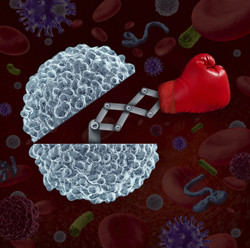Chemistry advances immune detection
T lymphocytes constitute the main arm of cell-mediated immune responses. They get activated through their T-cell receptor (TCR), which recognises different peptides presented on MHC molecules by other cells. In the past, to detect and quantify antigen-specific T cells, scientists have developed MHC tetramer assay reagents. In this technology four peptide-loaded MHC molecules are engineered to bind the protein streptavidin in a tetrameric complex. The use of fluorescently-labelled streptavidin facilitates the visualisation and quantitation of bound T cells. Overall, the MHC tetramer assay has great prospects for use in cancer immunotherapy as a means of monitoring T cell depletion or enrichment. However, its widespread use has been limited by the laborious processes required for synthesis and purification of individual peptide-MHC reagents. Recent technological advances in solid phase peptide synthesis (SPPS) have enabled the synthesis of MHC molecules. The EU-funded 'Protein stabilization by chemistry: total synthesis of an MHC class I scaffold' (PROCHEM) project also used chemical synthesis techniques to produce MHC molecules. The scope was to generate a truncated version of an MHC molecule based on specific human leukocyte antigen alleles. In this context, scientists developed an empty MHC platform by preparing peptide fragments separately and connecting them through chemical ligation. This MHC platform can in principle be loaded with desired peptide ligands, considerably increasing the applicability of MHC-based assay reagents. Apart from the field of adoptive T cell therapy, this novel approach could be used in vaccine development and the definition of novel antigens.







